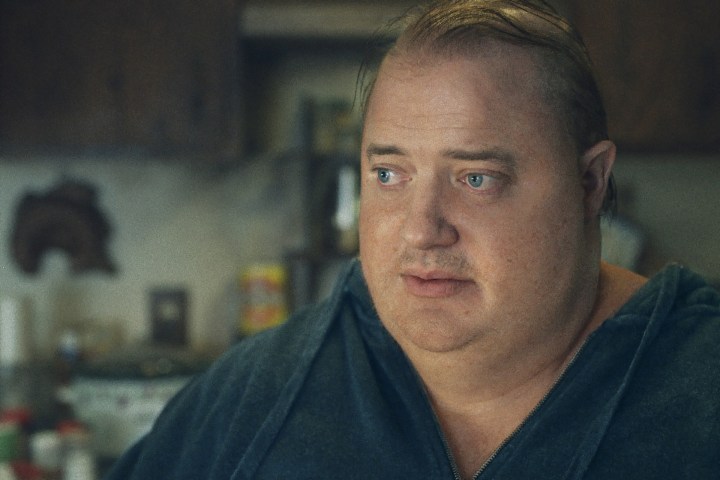In Darren Aronofsky’s The Whale, mounds upon mounds of prosthetics transform Brendan Fraser into a character many times his real size. That’s the hook of the movie, and its headline, and also its early controversy. Why, some have wondered, have such great resources been expended to allow an actor of Fraser’s average stature to play a role a naturally larger man could have occupied instead? Are so-called fat suits inherently dehumanizing, or have they just been put to that use in the past? Wherever one lands on such questions, the reality is that the elaborate full-body makeover of The Whale is no less real than anything else in this fatally overwrought melodrama of compulsion and atonement. Its dramatic heft is entirely phony, too.
Fraser plays Charlie, a college English professor who teaches remotely from his home in small-town Idaho. Charlie keeps his webcam off, telling his students it’s a technical error. In reality, he just doesn’t want them to see him, and discover the truth: that he’s a shut-in who weighs over 600 pounds. It’s been years since Charlie’s made any attempt to lose weight, and a new blood pressure reading puts him in the “call 911 immediately” danger zone. His overeating is killing him, rapidly and decisively. But he won’t go to the hospital.

The Whale offers therapy-couch explanations for what Charlie has slowly been doing to his body over the years. (He was always bigger, he explains, but not always this big.) It’s a symptom of grief that became a spiral of shame, and has gradually manifested in an apparent death wish. The film wheels out carts and carts of tragic backstory: an anguished grapple with sexuality, a lover lost to suicide, an abandoned family, an evangelical organization that played its damaging, judgmental part. The only pleasure Charlie seems to derive from life comes from rereading a personal scripture, an old student essay on Moby Dick from which the film draws its dual-meaning title. (His obsession with its unvarnished honesty is ironic in such a dishonest drama.)
Adapting his own decade-old stage play, Baskets creator Samuel D. Hunter makes little attempt to disguise the theatrical origins of The Whale, which unfolds over what we’re led to understand might be the last few days of Charlie’s life. Hunter’s screenplay is an overheated stew of hot-button issues, tackled by a supporting cast of characters that keep entering right and exiting left at regular intervals, nudging Charlie toward acceptance or possible redemption.
Among the ensemble of coming and going house guests is Charlie’s longtime friend, Liz (Downsizing’s Hong Chau), a nurse who checks up on him regularly, lecturing him about his health while also acquiescing to his pleas for unhealthy food. Hong is so tough and vulnerable and authentic in the role, it’s a shame she’s playing a character who can’t stop spilling her guts via torturously overwritten monologues. There’s also Thomas (Ty Simpkins), a young, fresh-faced missionary who rather conveniently wanders into the narrative and becomes determined to save Charlie’s soul before it departs. (Naturally, he has some demons of his own.) Most prominent is the protagonist’s estranged daughter, Ellie (Sadie Sink, best known as Max from Stranger Things), who he abandoned to start a new life years earlier. Given those sad circumstances, it’s kind of impressive how unsympathetic The Whale manages to make her. She’s a veritable cartoon of venomous teen angst, hurling slurs and cyberbullying insults at anyone in her proximity.

That last subplot, a bad-dad quest for forgiveness, recalls Aronofsky’s earlier The Wrestler, another portrait of a damaged man pushing his body to life-threatening extremes. One could, in fact, call corporeal abuse a regular theme of this hots-hot auteur’s work, mirrored by the hangnail-pulling ballerina meltdown of Black Swan and the spiraling eating-disorder addiction Ellen Burstyn endures in Requiem for a Dream. Here again, the director can’t resist indulging his fascination with grotesquerie. The Whale isn’t explicitly an act of callous fat-shaming, as some have declared the movie sight unseen; its aim is empathy. But too often does Aronofsky’s compassion curdle into a kind of nightmare pity, gazing upon Charlie as he masturbates on his couch in a state of co-mingled agony and pleasure, or as he desperately binges by the glow of his fridge.
Not that Fraser ever seems to be begging for pity. Grabbing maybe his meatiest role ever, no pun intended, the one-time A-list heartthrob of The Mummy and George of the Jungle wrestles mightily with the limitations of the overheated material. For all the suffering the film pours on his character, the star refuses to play Charlie as a morose sob story. He brings a hint of suppressed mirth, and a light sensitivity that clashes productively with the heaviness of the material. Burying him in latex might be a kind of stunt casting, but Fraser never lets the artificial girth he dons do the acting for him. Instead, he lets us see glimmers of the carefree charisma that defined his derring-do star turns of a Hollywood lifetime ago. The impression is not of someone swallowed by their disorder, but of a soul still flickering beneath the pain that spurred it.
But Fraser can’t overcome the contrivances, community-theater histrionics, or clanging artificial dialogue of Hunter’s play. Nor can Aronofsky, that inconsistent but always ambitious maestro of holy and earthly conflict. The Whale is easily his limpest drama, no matter how fully he commits to the black-box claustrophobia of the material or how incessantly Rob Simonsen’s operatic music swells and pleads. To get hung up on that cocoon of fake flesh Fraser inhabits is to miss the more essential shortcomings of the film. It wears it themes like shoddy prosthetics, a gimcrack illusion of profundity.
The Whale opens in select theaters December 9. Our coverage of the Toronto International Film Festival continues all week. For more of A.A. Dowd’s writing, please visit his Authory page.




